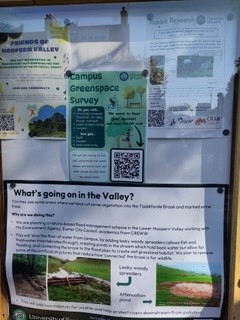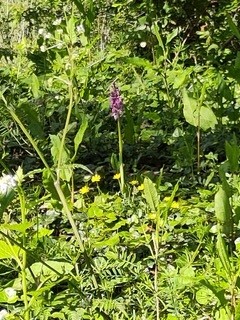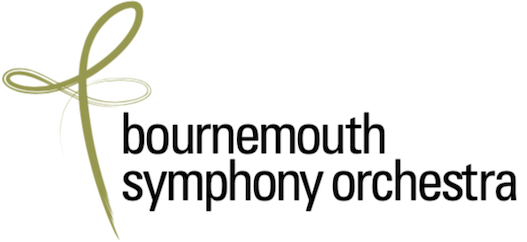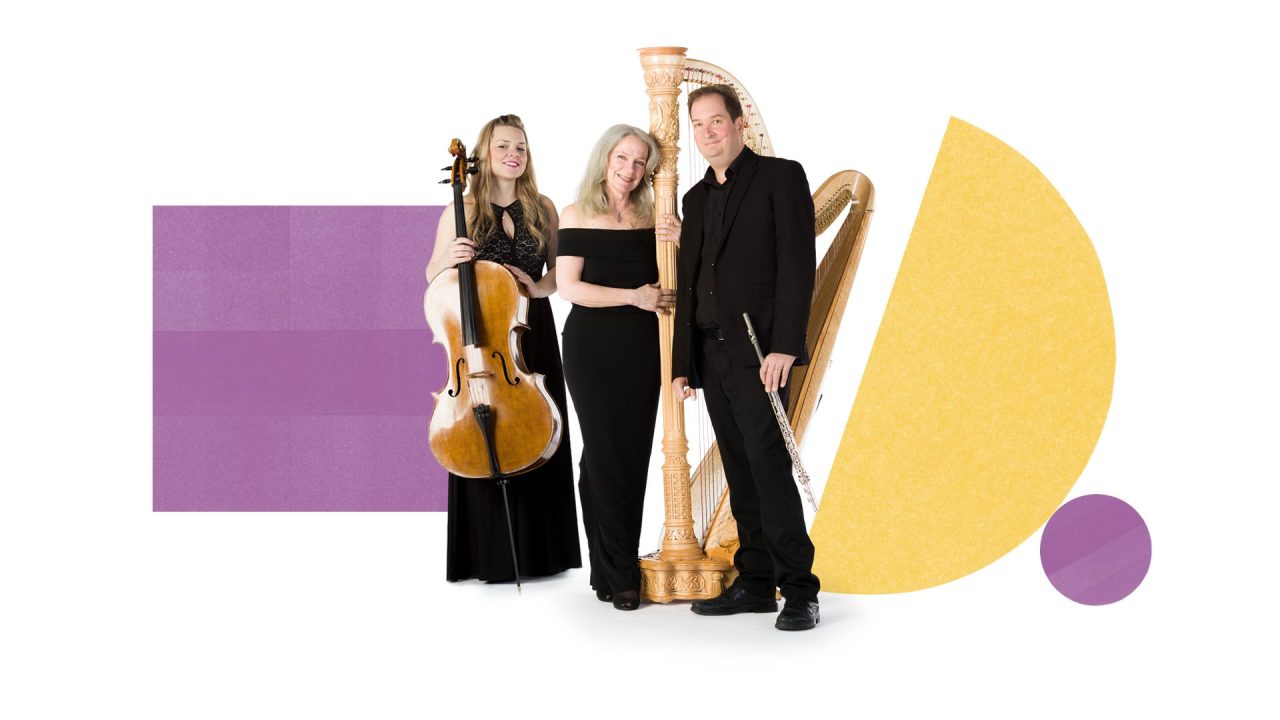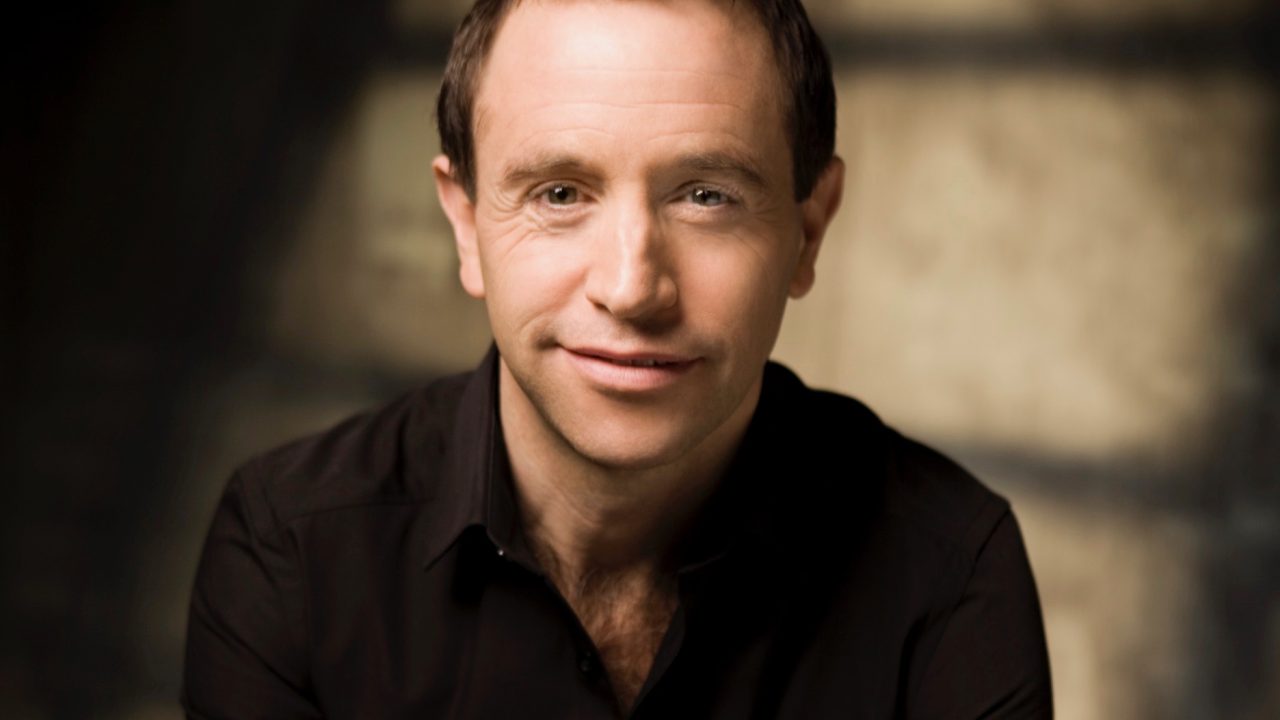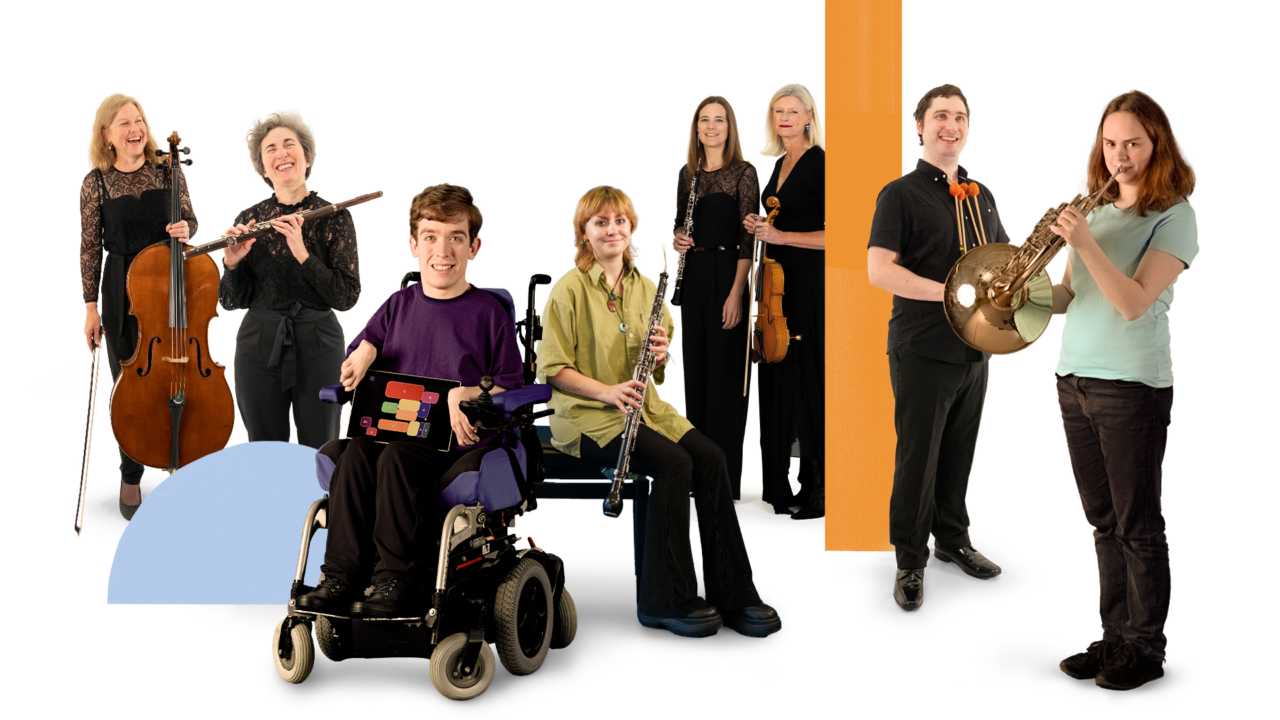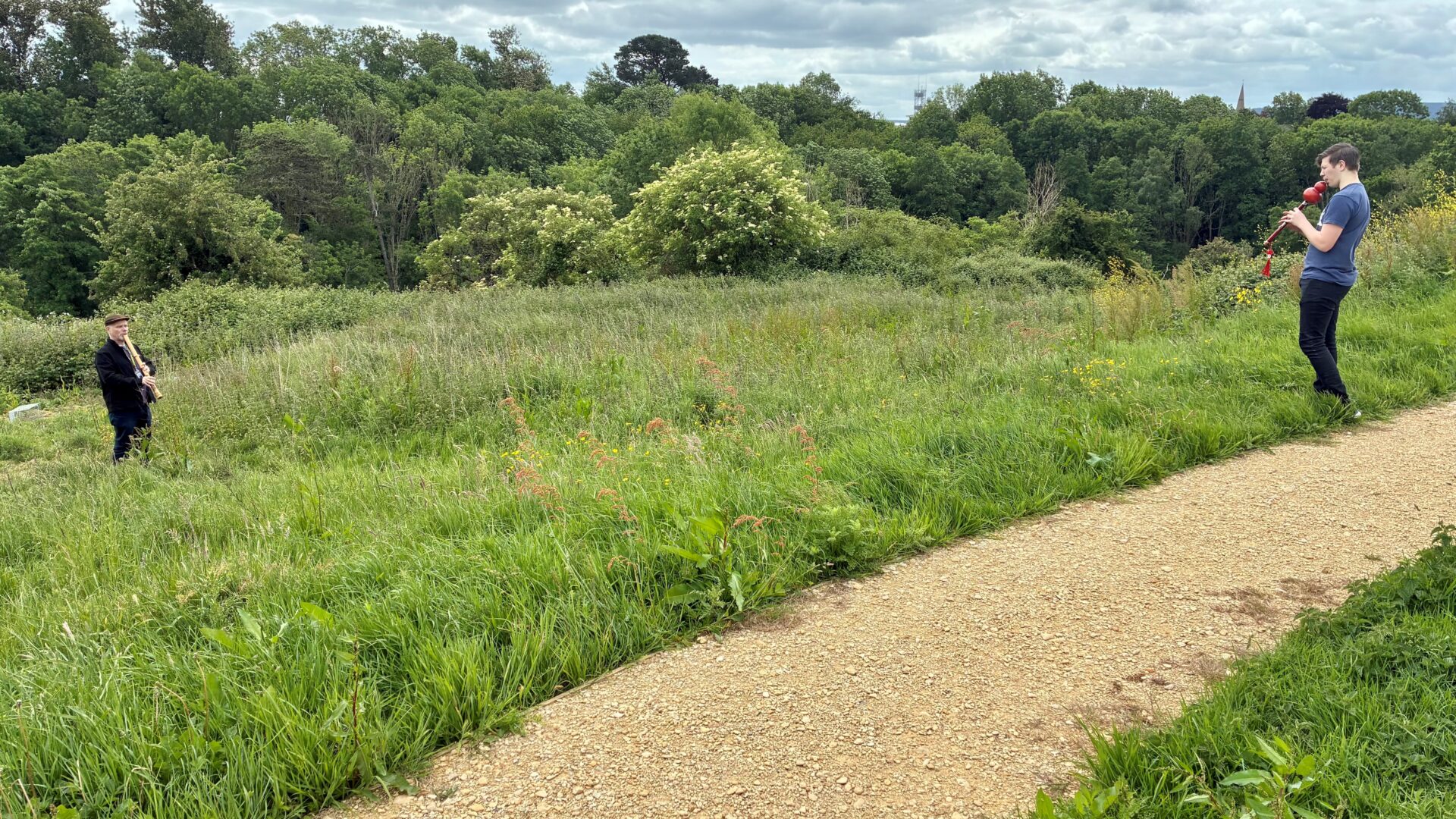The Earthlings, 22nd June 2025. Emma’s notes
22 humans attended, plus innumerable grasshoppers, painted ladies, ragwort, large families of seagulls & jackdaws…
We gathered under a threatening sky and searched for an area of ground near the picnic table that we could occupy that was less dense with ankle-height nettles and thistles. Rain was forecast for 11am – exactly the start time of our rehearsal. Sue, Mike, Kerry and Emma had attempted to erect a shelter but it was too windy, the ground too hard, and there were insufficient tent pegs for a successful pitch. So we spread out our blankets and tarpaulin and as people arrived we sat on the ground, close together, sharing umbrellas and protecting our instruments, telling ourselves ‘It’s just passing through’. And indeed, it didn’t rain on us again.
This confirmed our emerging narrative of this immersive project, which is that the Valley is resisting us, telling us to know our place. As Sue said afterwards ‘resistance from so many thistles and nettles to driving rain and swooping seagulls on the lookout for a sausage roll plus resemblance to visiting a relative who says hello and immediately asks when you think you might leave’.
As I welcomed everyone I felt grateful for this group of people and their resilience, determination and good spirits, even as the thistles pricked through our picnic blankets. We know that some people haven’t been able to tolerate the conditions of the Valley during our residency. We’ll need to reflect on the implications of this for the accessibility of The Earthlings. The nature of our group has undoubtedly been affected by the Valley. We have definitely adapted to it, sometimes by putting on socks and sun cream and hats.
We successfully rehearsed our five scores within the planned 1.5 hours. I particularly enjoyed ‘Coming Home’: pairs of musicians rehearsed their own composed Call and Response and tested how far apart we needed to be before we were out of earshot. I teamed up with Kerry and Astrid. Being in this trio formation meant I was fully focussed on Astrid. Both with our violins, we prepared our ‘Call’ and listened to Kerry’s tambourine ‘Response’. I showed Astrid how to hold her violin safely beneath her arm while we walked over the rough, sloping ground. We played our call together and listened for Kerry’s answer. As we moved away from the group the other sounds of the Valley became really obvious. ‘What’s that sound?’ asked Astrid. It was countless grasshoppers stridulating in the long grasses either side of our path. She hadn’t heard them before. I thought how similar the grasshoppers sounded to Kerry’s tambourine. Astrid and I went further and further away, kept playing our Call, and hearing Kerry’s Response. ‘Let’s go further’ said Astrid. I said no, we need to get back to the group. I don’t know whether she understood that we were rehearsing: probably everything is just ‘doing’, for Astrid. I learned a lot from this little encounter, and hope to develop more ways of working in a ‘small world’ way with the very young Earthlings.
At 12.30 we finished rehearsing and turned to picnicking. We were joined by Stella Tripp, Sara Campbell and two local families. It was immediately obvious that the terrain was quite hostile for the newly-arrived children who immediately sat on the ground with only their beautiful crocheted blanket between them and the nettles, despite my warning. I handed out our scores to everyone.
The presence of new arrivals made me realise that The Earthlings hasn’t been preparing to ‘perform’ in the traditional sense. We hadn’t organised where to stand, nor where our audience should be. This made it difficult for those newly-arrived to know where to position themselves. This makes me think more about Astrid’s just ‘doing’, and how that is largely what we do with The Earthlings. And particularly so within this Valley habitat, where we have not been putting our bodies, ourselves, our sounds, front and centre – either visually or acoustically. It takes care to invite an audience into this unfamiliar practice, and we (as a whole group, if we had thought of it) could have anticipated this and helped people into the space, better. I keep noticing how, as you are changed by this practice, you forget how you have adapted and it’s important to be aware of people’s different states of awareness and readiness.
During our rehearsal there was a strong sense of ownership, and even last-minute changes to the scores as it appeared that bits weren’t working or very clear. Everyone felt committed and engaged, although Astrid didn’t want to brandish her magic wand (brought at our request) very assertively at us!
Performing our pieces felt comfortable and authentic, to me.
We played:
We point at birds
- Sepic River
- Song
- Three-fold circular storm
- Coming Home
We point at birds
Sadly, the two visiting families didn’t manage to settle into the space comfortably. They all left during our Song. This disturbed me, but it didn’t appear to disturb the group at all – we were immersed in what we were doing.
Chris had visited the Valley with Zara during the previous week, and they had found and recorded a beautiful waterfall at the bottom of the valley. Chris played the recording to provide a continuous element during ‘Sepic River’. I love this ‘bringing something from the bottom of the valley’, since we haven’t been able to get the group that far during this project.
During our performance we noticed seagulls gathering and we realised that we had left our picnic, and its many dropped crisps, undefended. We interrupted the performance to tidy up. It’s notable that we hadn’t encountered any seagulls during this whole project in the Valley until we brought food into the space.
On cue, Anna immediately offered to read her poem, ‘We point at humans’, from the perspective of the birds of the Valley, a reversal of our found piece ‘We point at birds’. It was an extraordinary moment of recognition, connection, cause and effect, and play between us and ‘the others’.
The other ‘Turns’ people brought were similarly well-considered and prepared: Ian sang ‘There Was An Old Lady Who Swallowed A Fly’, and Martin sang ‘Coconuts’, offering us all the chance to join in easily. Mike played a gorgeous solo shakuhachi piece into the air. Ben sang, with backing from his phone, a Phantom of the Opera song which revealed his wonderful bass voice (new to us!) and passionate performing style. It is glorious to witness Ben’s emergence as a musician. Chris and I brought accounts of things found at the bottom of the Valley: mine, ’Dancing dots of light’. Chris, ‘an area with very beautifully-scripted graffiti saying ‘Anarchy’’.
Astrid was continuously at play within the habitat and our event, taking instruments and arranging them within the ragwort (which I told Kerry might be mildly irritating to the skin – useful to know). We enjoyed her committed gong-playing during Three-fold Circular Storm. Sadly, she and Kerry had to leave shortly before the end, we we weren’t able to perform our Coming Home Call & Response Trio! But this meant I was able to experience the piece from the audience.
We finished at 2.30 and it felt just the right length of event. Not rushed, but not lingering or too tiring for anyone. My remaining feeling is that we have just scratched the surface of how to make music ‘to, with and about the accompanying ambiences of the Hoopern Valley’.
Whether we are able to continue this relationship with the Valley depends partly on where we will be meeting during the coming year. It also depends on the group and everyone’s sense of connection and desire to deepen and extend the engagement. It would be very helpful to hear from people about how they found the residency. But also I’m aware that we have lost some people along the way, and that our community family orchestra needs to reflect the interests and needs of everyone who comes along.
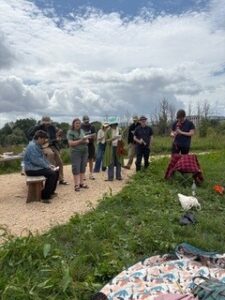
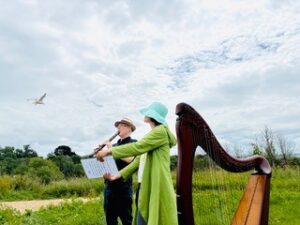
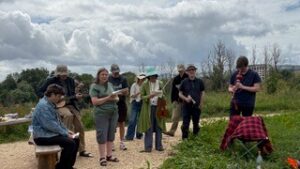
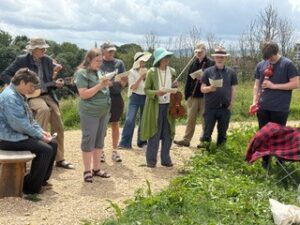
The Earthlings, 8th June 2025. Emma’s notes
We spent the entire session at the picnic bench at Lower Hoopern Valley. It is very much on the edge of the valley, and the sound of passing cars was always present. It also wasn’t very comfortable or easy to relax as a group because of the seating layout around the table. We’ll need to bring folding chairs and picnic blankets on 22nd. Another example of how the Valley is resisting/managing our presence, I feel.
We started by just ‘playing’. We chatted about this afterwards and some adults players shared that they felt quite exposed being easily visible from the road. This led to relatively timid playing compared with how we often sound when we play indoors. There was concern that someone might assume we were a Christian group.
We also talked about how different it is acoustically compared with indoors – no walls to bounce our sounds off.
Astrid was very active collecting instruments and exploring the immediate environment, including making a kind of nest for herself and some instruments within long grasses near the group. It feels that she is alongside the group’s music making, happily playing and composing a small world nested near the group which is also nested within the Valley.
We picked up where we had left off with creating the call and response piece. Mike and I demonstrated the process of composing a call and response. People formed pairs and composed their own call and response. We recorded each of them. We found that audibility was affected by the wind direction. Martin suggested that we start the picnic performance with this piece, but with the starting position of the ‘calling’ people beyond earshot, so the audience experiences their sounds approaching and then arriving close together. This means we’ll have to make sure everyone at the base is listening very attentively from the start.
Astrid wanted to stay with me, rather than call and respond over a distance. So maybe she and I make a team for this performance, and stay together, with Kerry staying at the base to respond to us.
Chris named this piece ‘Coming Home’.
(See ECFO Music section)
Someone passing asked whether we were rehearsing for something and said she’d join our picnic on 22nd with her flute.
We rehearsed ‘Three-fold circular storm’ with Astrid conducting at first, and then Steve conducting. Steve remarked on the experience of activating our sounds. He described it not as a feeling of power, but something unexpectedly enjoyable, being able to ‘play the group’ (my words) and experience the sonic response. We worked on differentiating between the three levels of playing so it sounds really clear to our audience. In general, ‘wild’ playing needs to be much wilder! And the softest sounds often need to be a bit more present to be audible.
Several times during the session, at the end of our own playing, we found ourselves lifted from only listening to ourselves to hearing all the Valley’s sounds. We noticed this, together. It seems this is a shift in awareness: we move between our own musicking and that of the Valley. We don’t really hear it all together. At these moments of Valley listening we did some spontaneous performances of ‘We point at birds’.
This was a really valuable session where for the first time we became properly immersed in the Valley’s ambiences. I could hear people’s musical choices being shaped by all the sounds around us. It feels like we’re still just at the surface, but we are finding our way in.
Plan for our Musical Picnic
22nd June 11 – 3 (Hoopern Valley picnic table, with Roborough as backup in case of bad weather).
11am – 12.30pm rehearse
12.30pm – 1.15pm picnic with audience, friends, family.
1.15 – 2.30pm music – Earthlings scores + ‘take a turn’.
2.30pm – 3pm wind up, pack up.
Please invite friends & family to join us for our Musical Picnic. Bring food to share, something to sit on and, if you wish, a musical turn!
Please email Emma to confirm whether you will be coming 22nd June.
And whether you’d like to do a turn. emma@emmawelton.net
Sunday 25th May 2025
Emma’s Notes, next sessions information and a note from Hugh…
Great West Run was a massive disruption today, and it was May Bank Holiday weekend. Still, we had an excellent session. I felt the group went on a journey from quite flustered and serious to very smiley and engaged. I put this down to the playful experiment we did with call and response in the Valley at the end. It was very windy – this may also have excited us, as it did the harp strings!
We introduced Adrian and Evelyn to the three scores already composed, which was a very good way of testing the scores.
We completed our 3rd score, ‘Three-fold circular storm’ with some additional clarifying phrases and added an intro and outro (the storm arriving and disappearing) – it was important to remember that our scores need to be understood and performable by everyone who attends – especially a 2 year old! So we held the space for the 2 year olds who come along even though they weren’t there today.
We experimented with ideas for a 4th score, for call and response, in situ at Lower Hoopern Valley. It doesn’t have a title, yet. This was a very beautiful thing to hear, as sounds repeated and moved around in space. We’ll clarify the music and complete this score next time.
Everyone wrote some text for a song, inspired by something from the Valley:
melodic cells…this wind lock in memory…Disappearing cocktail party listening…Buttercup rose rambling…Anna disappearing with tooting thing…I’m a sophisticated bird.
the wind is burping
wild roar of trees…Air on harp strings…Harp sings to itself
Stalks…conducting…the wind
Aeolian Harp…wind among the grasses
Birds…& nature connected & in…harmony.
I noticed that we didn’t have time to become properly immersed in the Valley’s ambiences. We need to create some slow time in the Valley
NEXT SESSION
8th June 10.30 – 12.30 IMPORTANT! We’ll spend the entire session in Lower Hoopern Valley, otherwise we’ll lose a lot of time walking to and from Thornlea.
We’ll meet at the picnic table close to Prince of Wales Road, where we’ve gathered before.
For precise location use this What 3 Words map: https://w3w.co/walks.combining.change
Some of the group will stay at the picnic table, and others will roam, and we’ll create scores that can be done by everybody.
Bring what you need to be comfortable and protected from weather, sun, ticks (eg trousers tucked into socks).
If you want to check anything at the last minute, text Emma on 07791 161050.
There will be no refreshments provided this week, so bring all you need!
(If the weather isn’t kind, we have booked Thornlea, University of Exeter, New North Road, Exeter, EX4 4LA. what3words.com/toys.minute.bags. We’ll confirm on Friday 6th June by email.
Plan for our Musical Picnic
22nd June 11 – 3 (Hoopern Valley, with Thornlea as backup in case of bad weather).
11am – 12.30pm rehearse
12.30pm – 1.15pm picnic with audience, friends, family.
1.15 – 2.30pm music – Earthlings scores + ‘take a turn’.
2.30pm – 3pm wind up, pack up.
Please invite friends & family to join us for our Musical Picnic. Bring food to share and, if you wish, a musical turn!
Please email Emma to let her know whether you will be coming on 8th and 22nd June.
And whether you’d like to do a turn. emma@emmawelton.net
…and finally
EXETER CONTEMPORARY SOUNDS & Hugh Nankivell
Emma is putting on a concert with Exeter Contemporary Sounds as part of Art Week Exeter at Exeter Central Library on Saturday 14th June, 2.30pm. It’s called ‘Lost & Found (keyboards revoiced)’ and will feature new music from Emma, Simon Belshaw, Paul Whitty and Hugh Nankivell.
More information about the concert here.
And a blog post from me about my piece in the concert and other things I’ve been doing recently
Hugh sends this message:
‘Dear Earthlings (sometime long ago known as Aubergines)
I hope you are all thriving and enjoying the recent dampness.
I am really looking forward to playing a new piece at a concert in Exeter soon on the wonderfully refurbished (by Ian of Earthlings) pipe organ.
My piece is called Fallow – and is a piece with falling notes and is quite different from if it was called ‘restorative boredom’ – even though it may boringly restore some of you.
The piece is still emerging – so if you have any emergent ideas using words flow, fall, fowl, low, flaw, loaf etc they could still be incorporated.
It will be great to see you in two Saturdays time if you can make it, and if not then that is also fine.
Best wishingtons
Hugh’
Sunday 11th May 2025
It was great to see Samri and Shine again. Shine very keen to explore all the instruments, play my violin and the piano – sadly there were no people with small violins here today that he could try.
We gathered indoors at Roborough and started by playing with no score as people arrived.
Making music to, with and about the accompanying ambiences of the Lower Hoopern Valley
We listened to our recording of Sepic River from last time, remembered the score and played it.
Sepic River by The Earthlings with Lower Hoopern Valley, 27.4.25
Steady drum pulse throughout, about 90bpm.
Melody instruments play 2-note patterns foraged from Hoopern Valley.
Valley visit
When we left Roborough to visit the Valley we found Bethan and Kamyar waiting patiently outside the door.
We gathered at the Valley’s picnic table with small stones brought by Mike and Emma from their homes. Standing in a circle, we played ‘rain cloud’ music, where only 5 people play at any one time. A conductor in the centre of the circle points at someone who clatters their stones wildly (the centre of the storm). The two people either side of them tap their stones moderately. The two people next out from them rub the stones gently. The conductor can choose to move the storm centre around the circle.
We planned to do a listening walk from the picnic table down to the bridge over Taddyford Brook, foraging materials for sound-making on the way. (One important rule here: don’t gather anything that’s alive! ie don’t break or kill anything!). As often happens, walking together stimulates conversation but as we went along we listened more and more and I heard people saying ‘what’s that bird?’.
Change of plan! soon after we started walking, it rained – surely in response to our music! So we sheltered beneath two huge downy oaks (maybe 150 years old). We explored the sounds of the bark (surprisingly hollow), and organised a quick call (Ben, on one side of an oak) and response (everyone else, on the other side).
It’s quite exciting doing these kinds of adventurous things, and it can stimulate a lot of chat! Also, there are hazards – Shine was exploring everywhere and we needed to explain about prickly brambles and nettles. But we listened to the rain all around us. And then we accidentally created another score: ‘We point at birds’.
We point at birds by The Earthlings with Lower Hoopern Valley, 11.5.25
Ben put our small foraged materials inside a hole in one of the oaks and we returned to Roborough for drinks and dryness.
Ian brought back a stick as tall as himself from beneath the two downy oaks. He attached his home-made contact mic to it and found many different sounds, played through his small portable amplifier.
We created Three-fold circular storm
Martin’s idea – to translate the ‘rain cloud’ piece onto instruments.
We give this piece more shape with some very simple conductor gestures – eg the start and end of the storm. We’ll work this out next time.
Three-fold circular storm by The Earthlings with Lower Hoopern Valley, 11.5.25
For more than 5 players + conductor.
Choose an instrument.
Gather in a circle with similar sound-types together.
Each musician prepares three types of musical material:
- Middle of storm (play wildy!)
- Edge of storm
- Distant storm
Conductor stands in the centre and points at one musician who clatters their stones wildly (the centre of the storm). The two musicians either side of them tap their stones moderately (the edge of the storm). The two musicians next out from them rub the stones gently (distant storm).
Musicians not in the group of 5 remain silent but ready.
The conductor moves the storm around the circle by pointing to the next person along.
Access
Not everyone finds it easy to walk the steep and uneven paths of the valley. Let’s bring in the idea of a ‘base group’ at the picnic table, and a ‘roaming group’ who gather sounds and make music from within the Valley.
Call and response
There’s an idea to develop a Call & Response piece in the Valley. Perhaps there’s a ‘base group’ at picnic table who listen to other players who are out of sight, and respond to what they hear.
Leave no trace
After the session, Ian and Emma returned Ian’s foraged branch back beneath the oak trees. Emma will try to find it on her way to the next session. Should we have a rule that any sound materials we forage from the Valley are returned to the Valley?
Summary
Earthlings music with Lower Hoopern Valley Scores so far:
finished scores
- Sepic Rover
- We point at birds
- Three-fold circular storm needs simple shaping
ideas in progress
- Piece with audience walking away from musicians – find a balance you like between human music and all the other music in the Valley.
- Call and response – idea of a ‘base group’ at picnic table and a ‘roaming group’.
Sunday 27 April 2025
A very positive feeling in the room and because we had new people and many new instruments which were very exciting for all of us to explore. We took time for everyone to introduce themselves and their chosen instrument. We noticed that very often people prefaced their little bit of playing with ‘I don’t know how to play this’ – and then amazed us by playing it!
Mike introduced his score ‘Points and Lines’ which we rehearsed and then performed. This is a really good example of a text score, with only two options for making sounds.
We took our refreshments to the edge of Hoopern Valley, listened, and talked about bringing our musicmaking into relation with the habitat during the coming sessions and for our shared musical picnic on Sunday 22nd June. We practiced walking together without chatting.
We returned to Roborough and listened to recordings from the jungle of Papua New Guinea. We also listened to the music of Dugalu Ganelan from Papua New Guinea – ‘sounds and songs of work, leisure and ritual to, with and about the accompanying ambiences of their forest home’. We quite quickly created a score that drew from our listening in Hoopern Valley and echoed some elements of the recording.
Music for and from Hoopern Valley
Steady drum pulse throughout.
Melody instruments play 2-note patterns foraged from Hoopern Valley.
Related events:
FLOW Orchard Dawn Chorus Sound Walk Sunday 4th May 5am
Emma will be there. All information can be found on the Eventbrite listing that you’ll find here
Lower Hoopern Valley official opening Tuesday 6th May 2pm – 6pm
There may be some tickets left, available here
Sunday 9 March 2025
A glorious, early spring day.
Ivor was fascinated by my violin and asked to hear Twinkle, twinkle. We discussed why that tune has the qualities it does – someone suggested it’s because of the big leap up from D to A at the start which then descends by step to resolve – onto D – in a comforting way.
Then we improvised, having agreed that we would finish on a comforting D together at the end. Some of us arrived at D quite early on, but the group continued playing – another example of group negotiation through music.
Playing
We played ‘Building a Shed’. This game helps us to develop a satisfying, connected group groove that is felt, not thought. But not everyone is keen to be involved. By the time we had built our shed, Ivor was keen to go outside, so we revised/learned Grand, Split Squid and then went…
…Outside
We visited the tree and sang our song to the Turkey Oak. It feels good to introduce new people to our habitat and the things we have noticed about it.
Noticing spring
We moved to the outdoor stage where Mike explained about Japanese Tanka (classic Japanese poetry, meaning “short poems.” Non-rhyming poetic form with 5 lines with syllables upper phrase: 5, 7, 5, lower phrase: 7, 7). We considered that, in addition to the 4 main seasons, the Japanese have 72 microseasons, each 5 days long:
Singly and in family pairs we had a quiet time together writing poetry, drawing on what our senses tell us on this, specific, spring day.
We created a very wide variety of poems! some located in senses, some inspired by the tree, dreamy ones, noticing ones, a mathematical one. We each read our poem aloud on the outdoor stage.
If you send Emma your poem (emma@emmawelton.net) we can share them on The Earthlings pages.
Gagaku Dice
Returning indoors, we revised/learned Gagaku Dice and all found a way into playing. Kerry found a 5/8 rhythm with shakers: chika-chika oom-pah-pah. We planned how we wanted to perform the piece today. I have a feeling that the piece will change each time it is performed. It has organised sequences and parts for more free playing. The 5/8ness is much more settled now. We performed Gagaku Dice with Sarah and Ivor’s poem and Astrid’s poem read, very bravely, over the top. A sense of completion.
Next session
Sunday 23rd March – a longer session: 10.30 – 3pm with shared lunch
Bring picnic to share, a mug for hot drinks. Invite friends and family to join us for lunch (12.30), and stay to listen and/or join in.
Future Dates
27th April
11th & 25th May
8th June – New Venue – The White House, Thornlea
Possible end of year longer session tbc on 22nd June: Picnic & music in Hoopern Valley?
Sunday 23 Feb 2025
Naomi joined for the first time, with a recorder that she hadn’t played for perhaps 30 years.
Ben brought his new rosewood hulusi for the first time and played us some melodies he has learned. Sounding beautiful. Pitches C D E F G A C D, I think. We all spent a bit of time learning the hulusi scale on our instruments.
I invited Paul to start an improvisation playing a looping riff on D and A on his hand pan. Starting this way led to some delicate music making with lightness and gaps in people’s playing.
It was another stormy morning, and the wind sounded wild and blustery around the building. We stopped to listen for a while, and then joined in with it, soughing on our instruments.
The fallen tree, a Turkey Oak, outside Roborough was being cut up this morning. Parts of it may be used to create ‘leaky dams’ in the lower Hoopern Valley just below Roborough as part of their plan to improve the biodiversity of the Valley Park and for flood management. Adrian says there are plans to use some of the wood creatively.
Our song for the Turkey Oak – Grand, split squid
We reminded ourselves of our song and developed it into a round. (* round starting points)
*Grand, split *squid
Grand, split squid
How are the mighty fallen
Maybe it just haft enough
[unison, much slower]
Maybe it just haft enough
Building a shed
We introduced the game to new people, practiced the speaking bits, and clarified our understanding of the loops so that each person’s rhythm is one 4/4 bar long and our rhythms cohere.
Martin was interested to translate the game onto instruments, adding a new rhythm around the circle one at a time, then dropping out one at a time. Martin started the first round, and it was successful although we became confused about how to drop out.
Having clarified the structure, we played again, beginning with a slow 12/8 pulse started by Ben. There’s a lot to learn from playing like this – choices we have about what and how much to play, how what we do connects with what others do, how much space to leave or occupy with our rhythm, how physically easy our rhythm is to sustain for a long period, what to do if accidental changes to the pattern occur. We finished the game in 4/4.
Really interesting discussion about this – Ben bringing in examples from Brechtian drama exercises about how we conform to or disrupt our group, and testing ideas about what it takes to divert a group to a different behaviour. We found that disruption can happen accidentally (by misunderstanding or mistake) or deliberately. We wouldn’t have been able to have this depth or length of discussion if there had been younger children in the group today. It confirmed to me about the importance of holding each session according to the people in the room, that they have agency to direct where the session goes and that my job is to make sure it’s working for everyone. I needed to move us on a couple of times from discussion back into playing.
Gagaku dice
New people learned the tune, other people revised it.
We worked on the rhythm backing: 1….5/1….5/1…5/1…
Chris and Adrian added a helpful regular bass and double-stopped quaver line, so we now have four components – rhythm section, rhythmic chords, bass, melody.
We repeated this for a long time as people learned their bits.
There was a feeling that the piece is strong and insistent. Adrian suggested that some text could be read over the music. What text, though? Adrian sent some Japanese poetry as a possible example. We’ll use this as inspiration to write our own spring-inspired haiku-type poetry outside, at the tree, at the next rehearsal.
Dates for your diary
Sunday 9 & 23 March (23rd is a longer session 10.30 – 3pm with shared lunch)
Sunday 9 February 2025
There were 15 of us today.
We improvised at the start. Adrian brought his cello and offered lots of musical ideas. Ian had brought an amplifier and his electric guitar and a homemade (in 1956!) contact mic consisting of a magnet attached to 2 wires that he told us about – I think some people will make their own mics now: there was a lot of interest.
The second improvisation began melodically and became quite energetic and rhythmic. Everybody fully engaged, playing freely, and a palpable sense of enjoyment.
Because of my promise to Oscar, we played the game ‘Building a shed’. It’s worth returning to this – it is really fun and silly and has a clear build towards a bonded group, rhythmically and socially.
After our break we all visited the huge fallen oak tree outside our building. It was a glorious day, and we hadn’t been outside yet, this year. Great to connect with the outside, I thought, and keep this embedded, habitat-aware practice going. (Nearby there was huge queue of students waiting for buses to take them to the races, which was a very odd counterpoint). We played some music at the tree, and composed a short song made of our words in response to the tree, which we thought looked like a squid, being on its side:
Grand Split Squid
How are the mighty fallen
Maybe it just haft enough.
We reprised Gagaku Dice with an organised rhythm section playing roughly on the 1,3 & 5 – quite tricky. We had thought we’d add another dice-led melody, but we’ll do that next time. Listening back to the recording, I wonder whether anyone might think of possible ways of arranging the existing tune – a counter melody, solos?
It was a bigger group, with a wider age spread today. Great fun and dynamic. I felt able to focus on the children, knowing that there was strong musical independence among the adults.
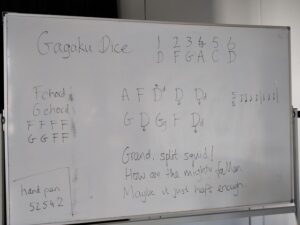
Sunday 26 January 2025
Earthlings 26.1.25 5 Ways to Wellbeing Prompts
Extremely stormy – the building was making sounds we hadn’t heard before – wind forcing its way through gaps in the roof and clattering windows, trees swaying outside. It was too stormy for Ian to come, today.
Adrian brought a wooden Irish transverse flute and a very high-pitched set of chime bars. Hilary brought her bassoon, Martin his ukulele, Evelyn her harp, Zara and Chris their violins, Anna a penny whistle, Paul a small hand pan, Mike his shakuhachi’s and lots of dice and Emma her violin. (I notice that we haven’t used the piano yet this year.)
We played ‘Building a shed’: within the same beat, each creating our own unique rhythm using our bodies and voices, sound and gesture – all up on our feet – or even (one of us) lying on the floor.
After talking about it, we played a second game of Building a shed, this time with mostly percussion instruments. Hilary played her bassoon seated (without a strap) so we built the shed to shelter her. We wondered afterwards whether we could build a shed in anything other than 4/4 time. Let’s return to this – there’s a lot more we could develop as a group – and Oscar needs to play it with us!
Mike brought a lot of dice, which he uses as a composition tool. We rolled and got 2 and 3. We took this to mean playing a pulse of 2 against 3 (Hilary shared a nice story about her formidable piano teacher telling her to think ‘Nice cup of tea’ in order to play 2 against 3 with different hands). We practiced this in two groups.
Chris suggested 2 + 3 = 5, so we practiced playing in 5/8 (‘hippopotamus’). (We discussed how some musical / dance cultures have 5 and 7 time signatures naturally built-in). Out of this emerged a new piece: ‘Gagaku dice’. We used dice to compose a 10-note melody on the available pitches of Adrian’s flute which began in 4/4 but we changed to 5/8. Martin and Chris accompanied with chords. We split into two groups for melody (first half) and melody (second half). It was wonderful to hear Evelyn’s harp sounding the melody as we composed it.
We played the Gagaku Dice melody several times to help us all learn it. It was not very easy to play, but we will be able to learn it! We will return to it to add more next time.
Evelyn shared that University grounds people are deciding what to do with the huge oak which fell outside Roborough in last autumn’s storm Darragh. We will visit it next time and make a piece about it.
We’ll put a sign with Emma’s number 07791 161050 on the door at future rehearsals so we don’t have to keep checking whether someone is stuck outside.
The lockers are full of Northcott Theatre production things. Jon thinks they will be empty by the next session. So we have taken the kettle and instruments and refreshments back home again!
Best wishes
Emma
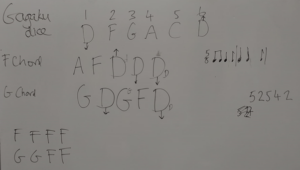
Gakagu Dice Music
Sunday 12 January 2025
We began with a long free improvisation, partly led by Heather and Leo’s exploration, listening, and excellent beat. Martin intervened by conducting after we had been playing for some time. It changed our music, and the way we listened. We found it more hierarchical, but also it came as a relief that there are now fewer decisions for us to make as players – perhaps more relaxed music making?
Ben had asked me in advance to bring my hulusi for him to play. It turned out he has thoroughly researched it. He enjoyed playing it throughout today’s session.
(If you were not at the session, here is what a Hulusi looks and sounds Video of a hulusi being played)
Mike brought his shakuhachi and treated us to a demonstration. We explored some of the similarities between it and the other wind instruments people were playing.
(again, here is a video of a shakuhachi…Playing the shakuhachi
Oscar was miming to his mum, so we started a new piece miming conversation/music to each other as way of starting, before finding our way to our instruments. I loved seeing Evelyn and Oscar sharing the melodica, and each of them spending time playing it on their own. Looking forward to hearing Evelyn’s harp when it is fixed.
I enjoyed Ben’s hulusi and Anna’s penny whistle exploration of what harmonies sound when they use the same fingering! Accidental harmony.
It was wonderful to hear Hilary’s cello again – so good to have a bass instrument in the group.
We had quite a vague start after the break and Chris spent a long time listening before joining in. I also found myself just listening instead of playing for some of today’s session. It is nice to be able to stop for a while and find that the music still finds its way.
We quite often comment that our music sounds really good towards the end of an improvisation – when some instruments have stopped played and we can hear (often the quiet instruments) exquisitely clearly in relation with each other. Maybe we could create these moments within our pieces as well as at the end.
I promised Oscar a game – so we will start with a game next time.
And we will do some dice rolling next time… what will that do to our music making?
We are very sorry that Paul came and couldn’t get in, despite some of us checking the door quite frequently. If this happens in future, my number s 07791 161050 – do text me or phone (Emma).
See you on 26th January, and don’t forget a mug for a hot drink.
O – and maybe see you at the FLOW Wassail on Sunday 19th Jan!
Rehearsal at Exwick Community Centre this Wednesday 15th 7pm if you want to join the band or learn to sing the song.
More info: https://floworchardexeter.uk/events/wassail-2025-save-the-date/
Gallery

